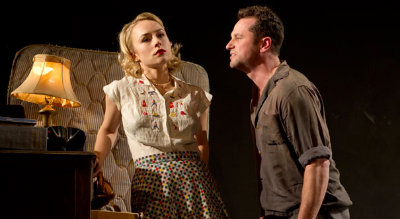Look Back in Anger
Produced by Roundabout Theatre Company

Sarah Goldberg and Matthew Rhys in LOOK BACK IN ANGER. Photo by Joan Marcus.
BOTTOM LINE: A good, not great, production of a groundbreaking British post-war drama; the play is required viewing for well-rounded theatregoers.
To a younger generation, Look Back in Anger is part of a Britpop song title, but for audiences in the mid-1950’s, it was a turning point. John Osborne’s cynical drama ushered in a new era in British theatre, introducing a genre (“kitchen sink realism”) and a character type (the “angry young man”). Even by today’s standards, its protagonist, Jimmy Porter, is frightening and hard—perhaps impossible—to love…unless, of course, you’re his wife, Alison.
The Roundabout Theatre Company is reviving Look Back in Anger, which ran on Broadway in 1957, in an off Broadway production directed by Sam Gold, whose recent work includes Broadway’s Seminar and Manhattan Theatre Club’s We Live Here. Already working in a small space, Gold chooses to up the ante by using what looks like only a third of the stage, presenting the Porters’ flat as long, exceedingly narrow, and cramped. The bed is a bare mattress that is leaned up against the wall during the daytime. The blanket and pillows are stuffed into a dresser drawer. What’s more, there is a third tenant, Jimmy’s friend, Cliff. It might seem awkward for a married couple to cohabit with a roommate in such cramped surroundings; however, we soon learn that, if not for the low-key Cliff, the tension between Jimmy and Alison might be even worse.
The central conflict between husband and wife is Jimmy’s obsession with British class differences generally, and their class difference in particular. A brutally intelligent working man with a love for jazz, Jimmy is both bewitched and repelled by Alison’s upper-middle-class aloofness. He is also haunted by painful childhood memories. Alison is worn out after three years of listening to Jimmy’s insults and accusations, but can’t resist him when he’s repentant or seductive: “I shall never love anyone as I love you,” she confesses, even in the midst of a quarrel. Cliff tries to lower the temperature between the two. However, when Alison’s old friend, Helena, comes into town and needs a place to stay, the status quo is disrupted and Alison has to make a choice.
In addition to the startling set design, Gold’s production includes some other bold adjustments, such as cutting an entire character. These choices might have had more impact had they gone hand in hand with a stronger concept for the performances. There are a few too many blanks left for the audience to fill in; thankfully, between the exceptional writing and the skilled acting, we need not strain too hard to fill them. Despite having been written over half a century ago, the play isn’t a museum piece; indeed, some of its dialogue sounds as if it could have been taken from one of our recent political discussions about “class warfare.” Jimmy may be bitter and angry, but he is also eloquent, and his eloquence becomes that of the text.
The cast does a fine job of bringing the combustible “family” of the play to life. Matthew Rhys, a British actor best known for his work on TV’s Brothers and Sisters, plays Jimmy, looking and sounding remarkably like Richard Burton, who starred in the 1959 film version. It’s a tough job to play a guy who starts out unpleasant and only gets worse, but Rhys captures both his cruelty and his insecurity. As Alison, Sarah Goldberg, fresh from the London stage, seems at first to be numb to her husband’s rage, but reveals deeper and deeper levels of pain throughout the action. Recent Roundabout favorite Adam Driver (Mrs. Warren’s Profession, Man and Boy) is a tall, broad actor with an oddly childlike manner, well cast as the simple but insightful Cliff. The cast member who could most have benefited from the support of her director is Charlotte Parry as Helena, who experiences the most drastic change of attitude of all the characters. Parry does as well as can be expected without the guidance a great director would provide; Helena’s psychology is right there in the text, waiting to be highlighted, but Gold was evidently not eager to paint the picture for the audience, choosing instead to focus on his stage pictures.
Even without a strong directorial hand, the Roundabout’s Look Back in Anger is a full serving of passionate, dark drama that will keep serious audiences involved for its entire two hours-plus runtime. As long as there are angry young men in the world, those who feel, as Jimmy does, that “people of our generation aren't able to die for good causes any longer…There aren't any good, brave causes left,” Osborne’s most famous play will be relevant to us, whether young, old, rich, poor, female or male. Like A Streetcar Named Desire or A View from the Bridge, it’s a mid-20th century play that reminds us where we’ve come from, and where we may be headed.
(Look Back in Anger plays at the Laura Pels Theatre, 111 West 46th Street between 6th and 7th Avenues, through April 8, 2012. Performances are Tuesdays at 7:30PM; Wednesdays at 2PM and 7:30PM; Thursday at 7:30PM; Fridays at 7:30PM; Saturdays at 2PM and 7:30PM; and Sundays at 2PM. Tickets are $71-$81 and are available at roundabouttheatre.org or by calling 212.719.1300.)

